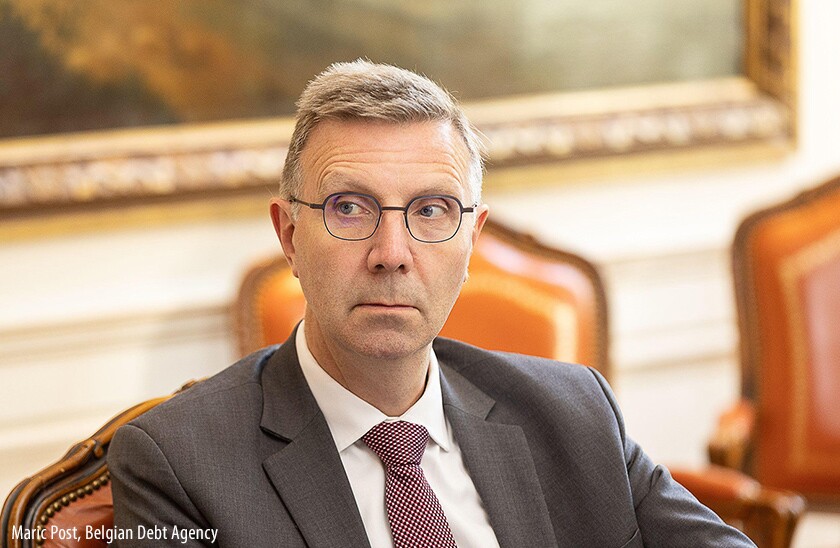The share of European government debt sold directly to retail investors accelerated markedly after July 2022, with Italy, Belgium and Portugal all tapping into strong demand from households looking for a better return than the miserly rates banks were offering. Now those countries are taking differing views on how much retail involvement they have in their debt raising.
The elevated retail funding volumes were a welcome relief to borrowers whose funding needs and deficits were still high after the pandemic.
The Italian treasury issued more than €33bn in its BTP Valore format in 2023. The product offers its exclusively retail investor base a special rate of income tax, exemptions from inheritance tax on coupons, and loyalty bonuses.
These borrowings outstripped the amount it raised through syndications that year. BTP spreads tightened as Italy’s institutional funding fell, even as Italian growth waned.
Belgium too raised record amounts from retail, including a €21.9bn one year issue in September 2023.
But wading into new territory has not been straightforward. Sovereign borrowers, which pride themselves on bringing predictable supply to their institutional investors, cut planned issuance to the wholesale market to satisfy retail demand. The size of Portugal’s series E savings certificates, for instance, eliminated the need for a second bond syndication last year.
Retail accounted for 50% of Portugal’s total 2023 funding. However, this year, its funding programme is almost 100% institutional, in the form of Portuguese government bonds and treasury bill issuance.
The country is now rated single-A by all the major ratings agencies. And even with the increase in supply this year, spreads versus peers have not widened, says Rui Amaral, board member at the Portuguese Treasury and Debt Management Agency.
Open network
We want to increase our offering… The digital transformation at the agency is underway. While the shift in our distribution has not yet produced results, we certainly expect it to in the future
Rui Amaral, Portuguese Treasury and Debt Management Agency
Portugal offers floating and fixed rate saving certificates to clients. Its series F, offered in May, is a 15 year floating rate instrument that pays Euribor flat, with a cap on interest at 2.5%. Holding premiums start at 0.25% in the second year. Buyers can request reimbursements.
As bank deposit rates increased in 2023, net subscriptions of savings certificates on offer at the time turned negative in the second half of the year. However, Portuguese activity in the retail market is expected to ramp up again, according to Amaral.
In March, Portugal opened up its distribution network for savings certificates, previously limited to the debt office and its postal network, to Portuguese banks.
Today, the agency has one digitally focused bank selling fixed and floating rate savings certificates and a handful of other banks have applied to follow suit.
“If demand for savings certificates picks up again, we expect it to become more popular with banks and our aim is to build up a more diversified distribution channel through most banks in Portugal,” says Amaral. “We expect this to be transformative for the Portuguese retail market and it goes hand in hand with digital transformation at the DMO.”
Savings certificates have gained particular favour with young people in Portugal. However, Amaral is wary of how reactive this demographic will be to bank deposits becoming more attractive. “We have to be ready for that,” he says.
About a million Portuguese citizens hold savings certificate accounts with the DMO. There is a €50,000 cap on investments, although this could be lifted. “We’re at a juncture with retail now,” says Amaral. “We want to increase our offering and we have all these accounts open. The digital transformation at the agency is underway. While the shift in our distribution has not yet produced results, we certainly expect it to in the future.”
Belgium’s retail debt landscape has also changed this year. In February, the government scrapped a break that halved withholding tax on its state notes from 30% to 15%.
It is widely believed that slashing the tax last year had fuelled demand for the September 2023 bumper issue.

One of the lessons we learned last year was that we needed a mechanism in place to limit subscriptions and steer away any uncertainty as to how big the issue might be. That could have unwanted impacts on a funding plan
The dramatic dip in demand evident from Belgium’s latest state note auctions in March 2024 — in which it raised just €413.29m — also largely reflects higher deposit rates, according to Fitch.
At the time of this year’s issue, head of funding at the Belgian Debt Agency, Maric Post, told GlobalCapital the regular tax rate was always going to be “a game changer”.
“It’s an interesting diversification for governments if it is meaningful in terms of amounts,” he said. “There is also a need to be able to steer issue volume. One of the lessons we learned last year was that we needed a mechanism in place to limit subscriptions and steer away any uncertainty as to how big the issue might be. That could have unwanted impacts on a funding plan.”
There is now a €6bn cap on subscriptions of Belgian state notes. The next issue at the time of writing was planned for June 4.
More recently, Italian households showed less enthusiasm for the fourth BTP Valore issue, with subscriptions coming in at €11.3bn versus the sovereign’s record €18.3bn issue in March.
Richard McGuire, head of rates strategy at Rabobank, says this was expected given retail holdings of liquid assets are below pre-pandemic levels and bank deposit rates are higher.
That doesn’t automatically mean Italian spreads should widen, according to McGuire, who said that foreign institutional demand was making up for the lag from retail.







